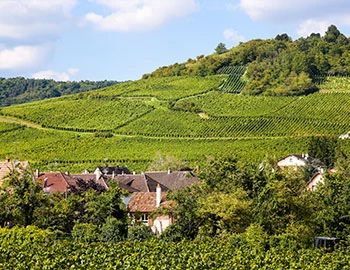Pouilly-Loché le Bourg 2022
AC, Domaine Marcel Couturier, 750 ml

| Grape variety: | Chardonnay |
| Producer: | Domaine Marcel Couturier |
| Origin: | France / Bourgogne / Mâconnais |
Description
Marcel Couturier's small domaine, based in Fuissé, was recently chosen by Robert Parker as the new Chardonnay icon of the Mâconnais! This elegant Burgundy comes from over 50-year-old vines that are farmed organically. Its inviting bouquet is typical of a Chardonnay from the Côte de Beaune, evoking tropical aromas of pineapple and passion fruit, as well as grapefruit and spicy lemon verbena, which develop after some time in the glass and combine with the delicate toasted aromas of the oak, adding delicate notes of almond and hazelnut. On the palate, le Bourg shows animating smoothness, precise acidity, generous yellow fruitiness and exciting minerality. A white Burgundy with good ageing potential, but also a pleasure to drink when young, if decanted.
Attributes
| Origin: | France / Bourgogne / Mâconnais |
| Grape variety: | Chardonnay |
| Label: | Vegan, Certified organic or biodynamic wine |
| Ripening potential: | 1 to 10 years |
| Drinking temperature: | 10 to 12 °C |
| Food Pairing: | Apéro riche, Baked egli fillets with tartare sauce, Whitefish fillets à la meunière, Asparagus specialities, Succulent chicken breast with cream sauc |
| Vinification: | pressing the whole grape, fermentation in wooden barrel |
| Harvest: | hand-picking |
| Maturation: | partly in wooden barrel/foudre |
| Maturation duration: | 11 months |
| Volume: | 13.5 % |
| Note: | Contains sulphites |
Domaine Marcel Couturier
Founded by Marcel Couturier with his first vintage in 2005, this small estate has made a name for itself. The winery is located in the commune of Fuissé in the southernmost part of Burgundy, with stunning views of the village of Loché, Mâcon and the great plain of Bresse.
Marcel Couturier is a humble and down-to-earth vigneron, offering a wide range of fresh, expressive, concentrated, and generous white Burgundies made from Chardonnay. Today, Marcel's two children, Cladie and Auxence, have joined their father in the winery.
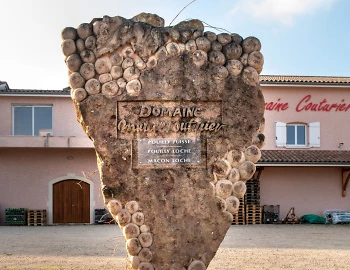
Chardonnay
King or beggar?
Hardly any variety of vine shows such a broad spectrum of quality as the Chardonnay. Its wines range from faceless neutrality to breath-taking class. It is an extremely low-maintenance vine, which explains why it is grown around the world – even in places where it probably should not be. The aromas of the Chardonnay variety are not very pronounced: a bit of green apple, a little hazelnut; in warmer latitudes, also melon and exotic fruits. The wines are often defined by maturing in casks. They develop more or less subtle notes of butter, toasted bread and vanilla. The grapes achieve their highest expression in their region of origin, Burgundy. Its heart beats in the Côte de Beaune: one might think of the plant growth of Meursault or Puligny-Montrachet. With their finesse and complexity, they can survive for decades. Chardonnay also achieves first class in some Blanc-de-Blancs champagnes. It additionally yields great wines in the Burgundian Chablis, and increasingly in Australia and Chile. A simple rule of thumb for pairing with food: When butter and cream are involved, you cannot go wrong with Chardonnay.
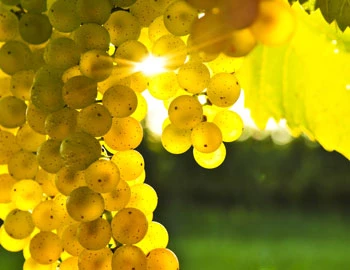
Mâconnais
Mâconnais: Chardonnay country
Around 7,000 hectares are planted with vines in the Mâconnais, close to 75 percent of which are Chardonnay. The Mâconnais is thus the most significant Chardonnay growing area in Burgundy in terms of numbers. Although it is the southernmost white wine area in Burgundy, distinctively light, crisp wines originate here. Thanks to improvements in quality in the vineyard and cellar, the quality of the wines from the Mâconnais has also increased markedly in recent years.
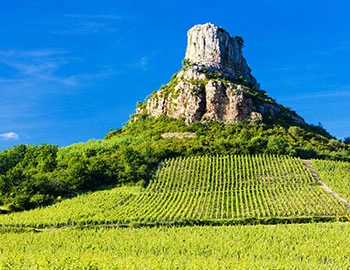
Bourgogne
Burgundy: home of the crus
Burgundy and Bordeaux are France’s most prestigious wine regions. Nonetheless, they are completely distinct in character: while Bordeaux, as the land of the chateaux, enjoys an aristocratic image, Burgundy has retained its rustic agrarian structure. Burgundy stretches for over 200 kilometres, from Dijon in the north to Lyon in the south. In a highly complex jigsaw of the most diverse of terroirs, Chardonnay and Pinot Noir demonstrate the subtle ways in which they embody their sources.
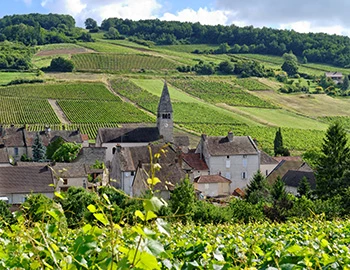
France
France – Philosophy in a bottle
According to French philosophy, wine should be an expression of the soil and climate. They use the word “terroir” to describe this. Terroir makes every wine different, and many especially good. French wine is regarded worldwide as an expression of cultural perfection. The French believe that humans are responsible for the quality of the berries, the vine variety for their character, and nature for the quantity. This philosophy can be expressed succinctly as: “the truth is the vineyard, not the man.”
